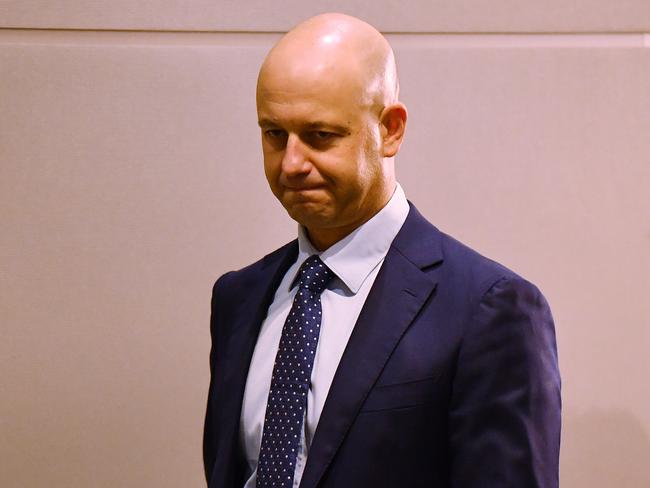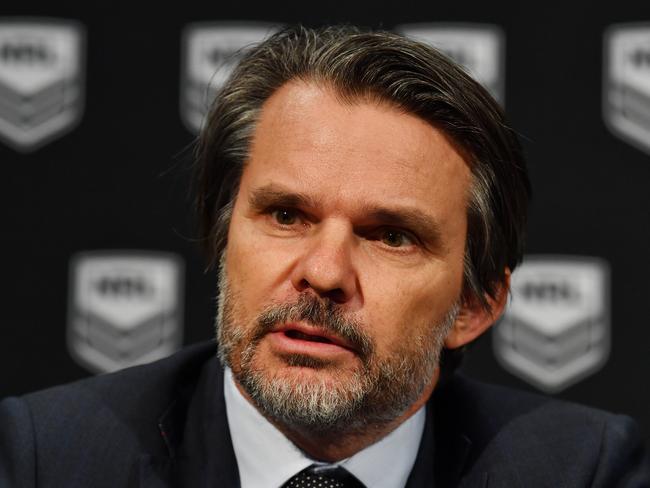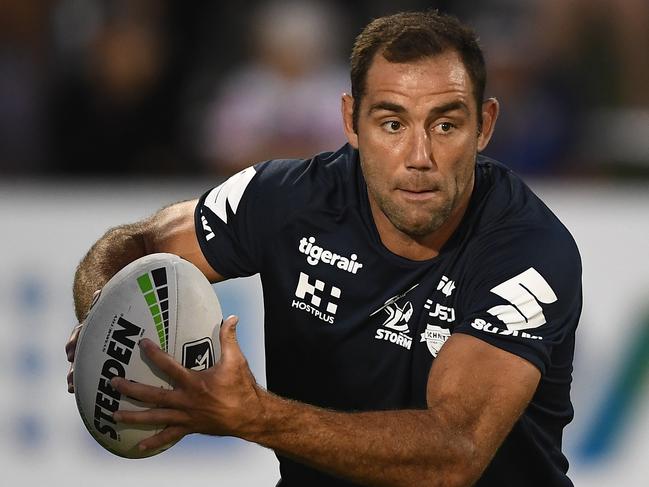NRL players likely to feel financial burden of game’s ongoing scandals
It is a real prospect that next year’s NRL salary cap could be reduced due to poor player behaviour. NRL CEO Todd Greenberg confirmed footballers could also face the financial brunt of a spate of scandals affecting the code, Jessica Halloran writes.
It is a real prospect that next year’s NRL salary cap could be reduced due to poor player behaviour.
NRL CEO Todd Greenberg confirmed under the collective bargaining agreement footballers could also face the financial brunt of a spate of scandals affecting the code.
Under the CBA a provision states “adverse changes” can see the NRL downwardly revise player payments and reduce the salary cap.
“We’ve got clauses in our collective bargaining agreement that if the game suffers financially, at an aggregated number, then everyone feels the pain and that includes the players,” Greenberg told The Sunday Telegraph.
“When you talk about genuine partnership, it works on the upside but equally it works on the downside.”

The CBA includes a provision where if the NRL has a $10 million reduction compared with an initial forecast — or clubs and the NRL have a $15 million reduction — then revenue player payments could be revised.
Greenberg is working hard to restore faith in the code and impressively announced a ‘‘no fault’’ stand-down policy for footballers charged with serious crimes.
MORE FROM JESSICA HALLORAN:
NRL, DRAGONS RISK PUBLIC WRATH OVER DE BELIN
SPONSORS WEIGH IN ON JACK DE BELIN CASE
Meanwhile, behind the scenes Greenberg has also revealed he has changed tact in his annual presentation at clubs this pre-season. Over recent months he has increased a focus on player leadership in an effort to “collectively” improve the game.
In pre-seasons gone by Greenberg would usually sit in say a lecture theatre, or similar, spending an hour giving a power point presentation to the playing group.
This year, himself and COO and head of integrity Nick Weeks have been engaging in more of an informal, round-table discussion with core groups of senior players which have been “fantastic”, “challenging” and productive.
“It’s not talking at them, but talking with them, we’ve been having good discussions around a table about expectations of our senior players and the role they can play inside their club,” Greenberg said.

After a “train wreck” of an off-season, including a spate of allegations of violence against women, most recently Penrith’s Tyrone May charged with two counts of allegedly filming and two counts of disseminating sexual acts with two women without their knowledge and consent, Greenberg has asked the senior players to take a greater leadership role.
“What I think the changes we can make is getting the senior players to understand that they have probably the greatest influence over younger players that are in those squads,” Greenberg said.
“That younger players fundamentally look up to them. People think that when a CEO or a chairman walk into the room that the players take notice but the people who they take most notice of are their peers, the peers they look up to.
“When Cameron Smith sits around the rest of his team those players idolise him. They look up to him and they respect him. What he says matters. That’s the point I am trying to get through to the rest of the senior groups of players; your words and actions really matter and have massive influence over your teammates.
“When you see something you are not comfortable with or it doesn’t align with your own values; don’t walk past it. Step forward and be the leader the game needs you to be.”

Greenberg says he hopes to develop a leadership training program in all 16 clubs for a core group of players, influential administrators and coaches. He points out while many players are naturally elected to leadership positions they may have not done a lot of formal training to get them there.
“A lot of the times in rugby league we need to develop our leaders, a lot of them are born very talented footballers, but may not be born as pure leaders,” he said.
“I think we have a huge duty of care to consistently put tools and resources to help them become the leaders we either want them to be or they want to be themselves.
“I get a sense there is an opportunity here, that the change we are making, can genuinely come from within, within those really good senior players. We have so many really strong, passionate, good principled men in these clubs and I want them to have that voice, to feel really confident and empowered to stand up around their teammates and call out inappropriate or behaviour that they feel doesn’t align to their values.
“I said to a player the other day, you can have values on the wall but you have got to value your own values. You’ve got to believe it and walk that talk every day. I think there is a real appetite to have these discussions.”
The greatest challenge comes from within the code when facing these issues.
No player should think they are bigger than the game — but some clearly do.
Then there’s the other narrative around all the disturbing sex videos doing the rounds.
There’s been people excuse-making and blaming the invention of the iPhone, WhatsApp, there’s theories about “leaks” to upset footy seasons and that the problem was society’s all deflect from the real issue; some very problematic cultures within some footy clubs.
The ARLC, the NRL has made a monumental change by raising the behavioural expectation of players and now, Greenberg says, the game needs to collectively come together and “stand up”.


